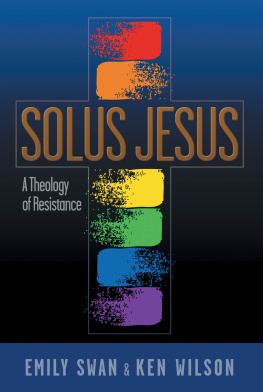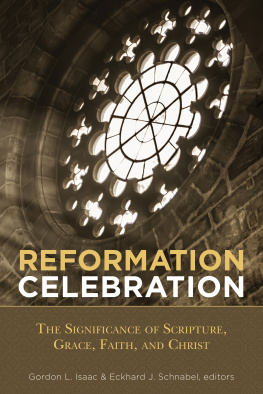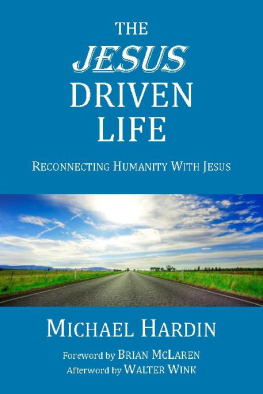Emily Swan - Solus Jesus: A Theology of Resistance
Here you can read online Emily Swan - Solus Jesus: A Theology of Resistance full text of the book (entire story) in english for free. Download pdf and epub, get meaning, cover and reviews about this ebook. year: 2018, publisher: Front Edge Publishing, genre: Religion. Description of the work, (preface) as well as reviews are available. Best literature library LitArk.com created for fans of good reading and offers a wide selection of genres:
Romance novel
Science fiction
Adventure
Detective
Science
History
Home and family
Prose
Art
Politics
Computer
Non-fiction
Religion
Business
Children
Humor
Choose a favorite category and find really read worthwhile books. Enjoy immersion in the world of imagination, feel the emotions of the characters or learn something new for yourself, make an fascinating discovery.
- Book:Solus Jesus: A Theology of Resistance
- Author:
- Publisher:Front Edge Publishing
- Genre:
- Year:2018
- Rating:5 / 5
- Favourites:Add to favourites
- Your mark:
Solus Jesus: A Theology of Resistance: summary, description and annotation
We offer to read an annotation, description, summary or preface (depends on what the author of the book "Solus Jesus: A Theology of Resistance" wrote himself). If you haven't found the necessary information about the book — write in the comments, we will try to find it.
If you read one book this year about the future of Christianity, then choose this book. Five hundred years ago the Protestant Reformation claimed the Bible as the authoritative guide for Christian living (Sola Scriptura! Only Scripture!). In this groundbreaking work, Emily Swan and Ken Wilson claim the authority of the church is shifting back to where it should be: in Jesus (Solus Jesus!). As co-founders of Blue Ocean Faith, Swan and Wilson are pioneering what it means to be post-evangelicalpost-Protestant, evenin a time when such re-imagining is desperately needed.
Solus Jesus not only grapples with the authority question in Christianity, but also provides a massive re-think of traditional atonement theories. Leaning on the work of Ren Girard, they conclude that the life, death, and resurrection of Jesus together reveal a completely good, non-violent God who is on the side of the oppressed and scapegoated of this world. As a work of queer theology, the book is intersectional in its understanding of justice, and invites readers to reconsider our understanding of what it means to follow Jesus.
This book is timely, to say the least. For Christians looking for guidance on how to address distressing issues of injustice; for help understanding how they can faithfully follow Jesus and love their neighbors as themselves; and for practices for how to experience the living Jesus and his Spirit of loveSolus Jesus is the book for you.
Born in a cauldron of faith and pain, Solus Jesus: A Theology of Resistance is a highly original, deeply provocative first stab at a post-evangelical, post-gay debate pastoral theology, writes David P. Gushee, author of Changing Our Mind and Director of the Center for Theology and Public Life at Mercer University.
Drawing from personal experience and those who have long carved out theologies far from power, Swan and Wilson show how Solus Jesus can open a portal to the divine communion that is possible between all people, writes Deborah Jian Lee, author of Rescuing Jesus: How People of Color, Women and Queer Christians are Reclaiming Evangelicalism.
Ken and Emilys book is loving and courageous, compelling and convicting, scholarly and personal all at once. ... This book held up a mirror to my heart, asking me to forsake my anxious need for certainty, to repent of all the rivalries that cripple me, and to rest again like a child, at the breast of a God in whose fierce and fearless love there is home for us all, writes the Rev. Susan K. Bock of Grace Episcopal Church in Mount Clemens, Michigan.
Solus Jesus challenges us to see the authoritative Jesus in a fresh light, so that his life, message, death, and rising summon us to live in a new way as individuals and congregations, writes Brian D. McLaren, author of The Great Spiritual Migration.
Around the world, tension and conflict are signaling a shift in our socio-political conditions. To remain relevant, Christianity must have a response to this moment. Grounding themselves in their lived experience, Ken and Emily are leaning into the conversation and offering a powerful response to the travails of our time. A must-read for Christians looking to discern where the Spirit is leading us in the 21st Century, writes Rev. Mariama White-Hammond, AME Church Planter, Boston.
Emily Swan: author's other books
Who wrote Solus Jesus: A Theology of Resistance? Find out the surname, the name of the author of the book and a list of all author's works by series.














